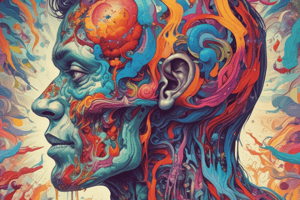Podcast
Questions and Answers
What is the main difference between schizophreniform disorder and schizophrenia?
What is the main difference between schizophreniform disorder and schizophrenia?
Which symptom is most commonly associated with psychotic disorders?
Which symptom is most commonly associated with psychotic disorders?
What distinguishes schizoaffective disorder from schizophrenia?
What distinguishes schizoaffective disorder from schizophrenia?
What is a common cause of psychosis?
What is a common cause of psychosis?
Signup and view all the answers
How is schizophrenia typically diagnosed?
How is schizophrenia typically diagnosed?
Signup and view all the answers
Which of the following is a common treatment option for psychotic disorders?
Which of the following is a common treatment option for psychotic disorders?
Signup and view all the answers
What is a common symptom of psychotic disorders characterized by extreme motor immobility or purposeless repetitive movements?
What is a common symptom of psychotic disorders characterized by extreme motor immobility or purposeless repetitive movements?
Signup and view all the answers
Which factor may contribute to psychotic symptoms by affecting brain function through trauma, tumors, or infections?
Which factor may contribute to psychotic symptoms by affecting brain function through trauma, tumors, or infections?
Signup and view all the answers
Which condition may lead to neuropsychological changes causing psychosis, among others?
Which condition may lead to neuropsychological changes causing psychosis, among others?
Signup and view all the answers
What is the primary diagnostic tool for schizophrenia according to the American Psychiatric Association?
What is the primary diagnostic tool for schizophrenia according to the American Psychiatric Association?
Signup and view all the answers
Which treatment approach for psychotic disorders involves addressing problematic behaviors and improving communication skills?
Which treatment approach for psychotic disorders involves addressing problematic behaviors and improving communication skills?
Signup and view all the answers
What intervention for psychotic disorders aims to support individuals in regaining lost skills through vocational training and education assistance?
What intervention for psychotic disorders aims to support individuals in regaining lost skills through vocational training and education assistance?
Signup and view all the answers
Study Notes
Psychotic Disorders: Comprehensive Overview
Psychotic disorders are severe mental illnesses characterized by abnormal thinking, perceptions, and behaviors that disrupt an individual's ability to interact with reality. Two primary symptoms of psychosis are delusions and hallucinations:
- Delusions: False beliefs or ideologies that persist despite evidence to the contrary. Examples include believing one is being controlled by outside forces or that someone else is in love with them.
- Hallucinations: Perception of non-existent entities or events. Auditory hallucinations are the most common form, causing individuals to hear voices or sounds that do not exist.
Types of Schizophrenia
One significant category of psychotic disorders is schizophrenia. This chronic condition involves disruptions in thought processes, emotions, and behavior. Further variations within schizophrenia spectrum include:
- Schizoaffective disorder: Combines elements of schizophrenia and a mood disorder, such as bipolar disorder or depression.
- Schizophreniform disorder: Similar to schizophrenia but symptoms persist for fewer than six months.
- Brief psychotic disorder: Occurs abruptly following a stressful event and resolves within one month.
Symptoms of Psychotic Disorders
In addition to delusions and hallucinations, psychotic disorders can manifest through several other symptoms:
- Disorganized thoughts: Thoughts that jump between unrelated subjects or fail to follow logic, making coherent communication challenging.
- Catatonic behavior: A pattern of behavior characterized by extreme motor immobility, rigidity, agitation, or purposeless, repetitive movements.
- Negative symptoms: Gradual decline in motivation, emotional responsiveness, speech production, and self-care, leading to social withdrawal.
Causes of Psychosis
While the exact causes remain unclear, research suggests that psychotic disorders may be influenced by genetic factors and environmental stressors. Some conditions associated with psychosis include:
- Substance abuse: Alcohol, illicit drugs, prescription medications, or substance withdrawal can trigger psychotic episodes.
- Brain injury: Trauma, tumors, or infection affecting brain function can contribute to psychotic symptoms.
- Neurodegenerative diseases: Conditions like Parkinson's disease, Huntington's disease, or HIV may lead to neuropsychological changes causing psychosis.
- Infections: Certain infections, such as syphilis, malaria, or Lyme disease, can impact brain areas responsible for cognition and perception, resulting in psychosis.
Diagnosis of Schizophrenia
Diagnosing schizophrenia involves a comprehensive assessment of the individual's medical history, psychiatric examination, and cognitive evaluation. Various diagnostic tools and guidelines exist, with the primary one being the American Psychiatric Association's DSM-5. However, diagnosis often relies on subjective interpretation due to the complexity of schizophrenia symptoms, which require careful differentiation from other mental health issues and organic brain disorders.
Treatment Options for Psychotic Disorders
The treatment approach depends on the underlying cause of the psychosis. Common interventions include:
- Pharmacotherapy: Antipsychotic medications help manage hallucinations, delusions, and thought disorder.
- Behavioral therapies: These may address problematic behaviors, improve communication skills, and promote coping strategies.
- Rehabilitation programs: Support individuals to regain lost skills and develop adaptive functioning through vocational training, work placement, and education assistance.
- Family therapy: Educates family members about the illness and trains them in supportive care techniques to improve overall wellbeing.
- Support groups: Encourage understanding, empathy, and sharing among patients and their families.
Remember, if someone is experiencing psychotic symptoms, it is crucial to seek professional help immediately. Resources like emergency departments, crisis hotlines (e.g., calling 911), or specialized clinics can provide necessary intervention.
Studying That Suits You
Use AI to generate personalized quizzes and flashcards to suit your learning preferences.
Description
Explore the comprehensive overview of psychotic disorders, focusing on schizophrenia and its variations, symptoms, causes, diagnosis, and treatment options. Understand delusions, hallucinations, disorganized thoughts, and negative symptoms associated with psychotic illnesses.




